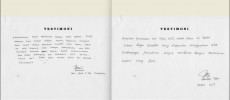
What Is Depleted Uranium Sent To
by:
Hendrikus Franz Josef, M.Si\
(International Relations Observer, CEO of The
https://www.youtube.com/@thehendrikuscenter2794)
Depleted uranium (DU) is a byproduct of the uranium enrichment process that is used in the production of nuclear weapons and fuel for nuclear reactors. DU is a heavy metal that is highly toxic and radioactive, and it has been used in military applications, such as armor-piercing ammunition and tank armor.
In recent years, there have been reports that
There are several reasons why depleted uranium may have been sent to
However, the use of depleted uranium in either of these contexts is highly controversial. The use of depleted uranium in military applications has been linked to a range of health problems, including cancer, birth defects, and other chronic illnesses. In addition, the use of depleted uranium in armor-piercing ammunition can also have severe environmental consequences, as it can contaminate soil and water sources.
Similarly, the use of depleted uranium in the nuclear industry is also controversial. While depleted uranium can be used as fuel for nuclear reactors, it is not a preferred fuel source because it is less efficient than other types of uranium. In addition, the use of depleted uranium in the nuclear industry also raises concerns about nuclear proliferation, as depleted uranium can be reprocessed into weapons-grade uranium.
Given these concerns, it is important that any use of depleted uranium in
In addition, it is also important that the Ukrainian government and international community take steps to monitor the health and environmental impacts of any use of depleted uranium in
Ultimately, the use of depleted uranium in
Depleted uranium (DU) is a byproduct of the uranium enrichment process and is used in various military applications. It has been used in the manufacturing of armor-piercing ammunition and tank armor, due to its density and ability to penetrate armor. However, the use of DU in warfare has been a topic of debate and concern due to its potential health and environmental effects.
When DU munitions are fired, they release fine particles of radioactive DU dust into the air, which can be inhaled or ingested by humans or animals. Exposure to DU can result in several health effects, including kidney damage, cancer, and birth defects. In addition, DU can contaminate soil and water sources, causing environmental damage and affecting ecosystems and food chains.
The effects of DU exposure were first observed during the Gulf War in 1991 when the
The use of DU in the Balkans during the conflicts in
The effects of DU exposure are not limited to the immediate aftermath of the conflict. DU dust remains radioactive for millions of years, and its effects can last for generations. In
The use of DU in warfare raises serious ethical questions, particularly in relation to the principles of proportionality and precaution. Proportionality requires that the use of force is necessary and does not cause disasterdamage.
Opini Lainnya
 OLEH-OLEH DARI JEPANG BAGIAN KEDUA
OLEH-OLEH DARI JEPANG BAGIAN KEDUA
OLEH-OLEH DARI JEPANGSuatu pengalaman ketika ditugaskan ke Kyoto Jepang selama semingguOleh :AlipSudardjoBAGIAN...
 From Sister Province to Sister Libraries: Sebuah Kesempatan Kerj
From Sister Province to Sister Libraries: Sebuah Kesempatan Kerj
Tanggal 25 Oktober 2010 menjadi momen bersejarah bagi Provinsi DIY dan Kyoto Prefecture. Peringatan 25 tahun kerjasama antara...
 IS GOD AN ALIEN FROM THE FIFTH DIMENSION?
IS GOD AN ALIEN FROM THE FIFTH DIMENSION?
IS GOD AN ALIEN FROM THE FIFTH DIMENSION? by. Hendrikus Franz Josef, M.Si (International Relations Observer, CEO The Hendrikus...
 The Future of Quantum Computers
The Future of Quantum Computers
The Future of Quantum Computers by. Hendrikus Franz Josef, M.Si, (International Relations Observer, CEO The Hendrikus ...

 Kegiatan Penyususnan Katalog Induk Daerah (KID)
Kegiatan Penyususnan Katalog Induk Daerah (KID)